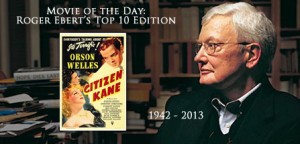The Film: Citizen Kane (1941)
The Principles: Orson Welles (Director). Herman Mankiewicz and Orson Welles(Writers) Orson Welles, Joseph Cotton , Agnes Moorehead, William Alland
The Premise: We see the life in flashbacks of one Charles Foster Kane. Media mogul, political magnate, and creator of XANADU!
Is It Good:
Movie critics are constantly asked, “What’s your favorite film?” I found it easy to reply “Citizen Kane,” hoping that my questioner’s eyes would glaze over and I could avoid a debate. Now I can say “Vertigo.” When I am told, “I’ve never seen what’s so great about it,” I can reply: “That’s fascinating from an autobiographical point of view.” – Roger Ebert.
That’s an interesting quote I found in a piece he did last year when Vertigo usurped Kane from the #1 film of all time spot. I never saw Kane until 2010, and after seeing the numerous parodies in such things as The Critic and The Simpsons, even in Family Guy, as well as hearing that it was usually placed in the #1 spot in top films list of all time. This did lead to me being at first not very “wowed” by it.
Now, I would never flat out say “I’ve never seen what’s so great about it.” That’s preposterous. I completely understand what’s so great about it. The film is a classic and inspired many films. I respect that, and I respect the film. That said, when I see it, I think seeing those tv shows that parodied it kind of soured me on the original film, and when I finally saw it I was happy to see where all those parodies originated, but in the end I was thinking “That’s it?” That was all my thoughts on my initial viewing. However now upon revisiting it, I am now realizing why it is held in such high regard.
Still, you can’t deny that the film has many qualities that justify why it’s held so highly. Welles really did a lot of things that were unconventional for the time. The use of deep focus, to keep everything clearly visible, even in the background is used throughout the film.
Rather than simply tell the story of Charles Foster Kane from humble beginnings as an orphan who is educated, becomes a rich man, then is shattered and left alone to die, we are told everything in flashback. A framing narrative is used of a newsreel reporter who is meeting with associates and ex-wives of Kane to discover the meaning of his final word. Rosebud. Of course other films previously had flashbacks, but none used flashbacks as extensively as Citizen Kane did.
We also get numerous low angle shots that show above the actor’s heads. You may thing “What’s so special about that?” Well, before Kane, no film showed the ceilings of where the characters were, because there were no ceilings. Just lights and microphones. Welles worked around this by placing tarps that could pass as a ceiling in order to still conceal the boom microphones. There was even a point where Welles had a trench dug into the floor to allow the low angle shot of Kane after his election loss.
Then we have makeup effects. Orson Welles was 25 when he made Kane, and he decided to play the role from being a young man, to being old. Welles, overweight at the time, was transformed into a svelte and dashing young man, then a middle age man where Welles was able to look basically as he actually did waist wise. Finally he was turned into an old man, as did the rest of the cast at various times in the film.
Is It Worth A Look: You bet it is. You can’t call yourself a fan of cinema without seeing this film at least once. Whether you like it or not, it is essential viewing. After revisiting it, I’m coming to appreciate it even more myself. Just goes to show that even a madman like me can have a moment of clarity! Get the dvd, get the blu-ray. Get it from Netflix, watch it on Amazon Instant. JUST SEE IT! Marvel at seeing so many moviemaking firsts, and how Orson Welles was truly a genius of cinema. Starting with his first film. Roger Ebert even does a commentary track on the dvd/Blu-ray!
Random Anecdotes:
Charles Foster Kane, the character and his life, bore such a resemblance to William Randolph Hearst’s life that he offered RKO over $800,000 to burn all prints and the negative.
Herman Mankiewicz wrote the bulk of the script from a hospital bed while he was recovering from an illness.
During the 1980’s Ted Turner mentioned he wanted to colorize Citizen Kane, but it just turned out to be him simply wanting to piss off colorization critics.
Despite now being recognized as a classic, when it was released the film was a flop, and it wasn’t until airing on tv in the 1950’s that it started to gain the recognition it rightfully deserved.
Cinematc Soulmates: Every movie made after Citizen Kane.
